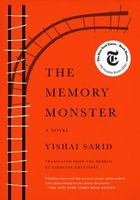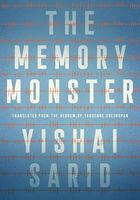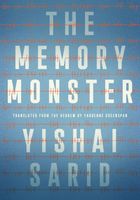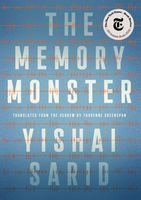- Welcome to FictionDB, Guest
- | My Account
- | Help

The Memory Monster — Yishai Sarid
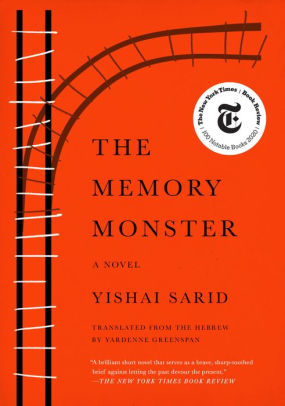
The controversial English-language debut of celebrated Israeli novelist Yishai Sarid is a harrowing, ironic parable of how we reckon with human horror, in which a young, present-day historian becomes consumed by the memory of the Holocaust.
Written as a report to the chairman of Yad Vashem, Israel's memorial to the victims of the Holocaust, our unnamed narrator recounts his own undoing. Hired as a promising young historian, he soon becomes a leading expert on Nazi methods of extermination at concentration camps in Poland during World War II and guides tours through the sites for students and visiting dignitaries. He hungrily devours every detail of life and death in the camps and takes pride in being able to recreate for his audience the excruciating last moments of the victims' lives.
The job becomes a mission, and then an obsession. Spending so much time immersed in death, his connections with the living begin to deteriorate. He resents the students lost in their iPhones, singing sentimental songs, not expressing sufficient outrage at the genocide committed by the Nazis. In fact, he even begins to detect, in the students as well as himself, a hint of admiration for the murderers -- their efficiency, audacity, and determination. Force is the only way to resist force, he comes to think, and one must be prepared to kill.
With the perspicuity of Kafka's The Trial and the obsessions of Delillo's White Noise, The Memory Monster confronts difficult questions that are all too relevant to Israel and the world today: How do we process human brutality? What makes us choose sides in conflict? And how do we honor the memory of horror without becoming consumed by it?
Praise for The Memory Monster
“Award-winning Israeli novelist Sarid's latest work is a slim but powerful novel, rendered beautifully in English by translator Greenspan…. Propelled by the narrator's distinctive voice, the novel is an original variation on one of the most essential themes of post-Holocaust literature: While countless writers have asked the question of where, or if, humanity can be found within the profoundly inhumane, Sarid incisively shows how preoccupation and obsession with the inhumane can take a toll on one's own humanity…. it is, if not an indictment of Holocaust memorialization, a nuanced and trenchant consideration of its layered politics. Ultimately, Sarid both refuses to apologize for Jewish rage and condemns the nefarious forms it sometimes takes. A bold, masterful exploration of the banality of evil and the nature of revenge, controversial no matter how it is read.”
-- Kirkus Reviews, Starred Review
“[A] record of a breakdown, an impassioned consideration of memory and its risks, and a critique of Israel's use of the Holocaust to shape national identity…. Sarid's unrelenting examination of how narratives of the Holocaust are shaped makes for much more than the average confessional tale.”
-- Publishers Weekly
“Reading The Memory Monster, which is written as a report to the director of Yad Vashem, felt like both an extremely intimate experience and an eerily clinical Holocaust history lesson. Perfectly treading the fine line between these two approaches, Sarid creates a haunting exploration of collective memory and an important commentary on humanity. How do we remember the Holocaust? What tolls do we pay to carry on memory? This book hit me viscerally, emotionally, and personally. The Memory Monster is brief, but in its short account Sarid manages to lay bare the tensions between memory and morals, history and nationalism, humanity and victimhood. An absolute must-read.”
-- Julia DeVarti, Literati Bookstore (Ann Arbor, MI)
“In Yishai Sarid's dark, thoughtful novel The Memory Monster, a Holocaust historian struggles with the weight of his profession…. The Memory Monster is a novel that pulls no punches in its exploration of the responsibility -- and the cost -- of holding vigil over the past.”
-- Eileen Gonzalez, Foreword Reviews
Praise for the Hebrew Edition:
“The most meaningful book ever written here about morals and victimhood. Alongside Primo Levi and Hannah Arendt, it forms a ‘holy trinity.'”
-- Navit Barel
“The book is gutsy, disconcerting, the kind of book it's hard to break away from until the final page."
-- Nahum Barnea, Yedioth Ahronoth
“Sarid performs the most important act that literature can offer us -- the story that he has written represents, to the same extent as it creates, what has been and what will be, in a process that enables thought about what there is, but also about what there could be.… The book weaves the sub-plots into its central course with satisfying skill. The various plot lines join together, reverberate and create contacts that it is possible to describe only in musical language.… A slim volume, but it provides a protracted read, and I carry it inside myself and wonder about it.”
-- Uri S. Cohen, Haaretz
Praise for the German Edition:
“Perhaps the most important novel about the Holocaust and Holocaust memory to have been written in the last ten years.”
-- Bill Niven, The British Association of Holocaust Studies
About the Author:
Yishai Sarid was born and raised in Tel Aviv, Israel in 1965. He is the son of senior politician and journalist Yossi Sarid. Between 1974-1977, he lived with his family in the northern town of Kiryat Shmona, near the Lebanon border. Sarid was recruited to Israeli Army in 1983 and served for 5 years. During his service, he finished the IDF's officers school and served as an intelligence officer. He studied law at the Hebrew University of Jerusalem. During 1994-1997, he worked for the Government as an Assistant District Attorney in Tel-Aviv, prosecuting criminal cases. Sarid has a Public Administration Master's Degree (MPA) from the Kennedy School of Government at Harvard University (1999). Nowadays he is an active lawyer and arbitrator, practicing mainly civil and administrative law. His law office is located in Tel-Aviv. Alongside his legal career, Sarid writes literature, and so far he has published five novels. Sarid is married to Dr. Racheli Sion-Sarid, a critical care pediatrician, and they have three children.
About the Translator:
Yardenne Greenspan is a writer and Hebrew translator. She has an MFA from Columbia University and is a regular blogger for Ploughshares. She has worked with authors such as Amir Gutfreund, Yirmi Pinkus, Alex Epstein, Shimon Adaf, and Etgar Keret. Her work has appeared in The New Yorker, Haaretz, Guernica, Literary Hub, Blunderbuss, Apogee, The Massachusetts Review, Asymptote, and Words Without Borders, among other publications.
Written as a report to the chairman of Yad Vashem, Israel's memorial to the victims of the Holocaust, our unnamed narrator recounts his own undoing. Hired as a promising young historian, he soon becomes a leading expert on Nazi methods of extermination at concentration camps in Poland during World War II and guides tours through the sites for students and visiting dignitaries. He hungrily devours every detail of life and death in the camps and takes pride in being able to recreate for his audience the excruciating last moments of the victims' lives.
The job becomes a mission, and then an obsession. Spending so much time immersed in death, his connections with the living begin to deteriorate. He resents the students lost in their iPhones, singing sentimental songs, not expressing sufficient outrage at the genocide committed by the Nazis. In fact, he even begins to detect, in the students as well as himself, a hint of admiration for the murderers -- their efficiency, audacity, and determination. Force is the only way to resist force, he comes to think, and one must be prepared to kill.
With the perspicuity of Kafka's The Trial and the obsessions of Delillo's White Noise, The Memory Monster confronts difficult questions that are all too relevant to Israel and the world today: How do we process human brutality? What makes us choose sides in conflict? And how do we honor the memory of horror without becoming consumed by it?
Praise for The Memory Monster
“Award-winning Israeli novelist Sarid's latest work is a slim but powerful novel, rendered beautifully in English by translator Greenspan…. Propelled by the narrator's distinctive voice, the novel is an original variation on one of the most essential themes of post-Holocaust literature: While countless writers have asked the question of where, or if, humanity can be found within the profoundly inhumane, Sarid incisively shows how preoccupation and obsession with the inhumane can take a toll on one's own humanity…. it is, if not an indictment of Holocaust memorialization, a nuanced and trenchant consideration of its layered politics. Ultimately, Sarid both refuses to apologize for Jewish rage and condemns the nefarious forms it sometimes takes. A bold, masterful exploration of the banality of evil and the nature of revenge, controversial no matter how it is read.”
-- Kirkus Reviews, Starred Review
“[A] record of a breakdown, an impassioned consideration of memory and its risks, and a critique of Israel's use of the Holocaust to shape national identity…. Sarid's unrelenting examination of how narratives of the Holocaust are shaped makes for much more than the average confessional tale.”
-- Publishers Weekly
“Reading The Memory Monster, which is written as a report to the director of Yad Vashem, felt like both an extremely intimate experience and an eerily clinical Holocaust history lesson. Perfectly treading the fine line between these two approaches, Sarid creates a haunting exploration of collective memory and an important commentary on humanity. How do we remember the Holocaust? What tolls do we pay to carry on memory? This book hit me viscerally, emotionally, and personally. The Memory Monster is brief, but in its short account Sarid manages to lay bare the tensions between memory and morals, history and nationalism, humanity and victimhood. An absolute must-read.”
-- Julia DeVarti, Literati Bookstore (Ann Arbor, MI)
“In Yishai Sarid's dark, thoughtful novel The Memory Monster, a Holocaust historian struggles with the weight of his profession…. The Memory Monster is a novel that pulls no punches in its exploration of the responsibility -- and the cost -- of holding vigil over the past.”
-- Eileen Gonzalez, Foreword Reviews
Praise for the Hebrew Edition:
“The most meaningful book ever written here about morals and victimhood. Alongside Primo Levi and Hannah Arendt, it forms a ‘holy trinity.'”
-- Navit Barel
“The book is gutsy, disconcerting, the kind of book it's hard to break away from until the final page."
-- Nahum Barnea, Yedioth Ahronoth
“Sarid performs the most important act that literature can offer us -- the story that he has written represents, to the same extent as it creates, what has been and what will be, in a process that enables thought about what there is, but also about what there could be.… The book weaves the sub-plots into its central course with satisfying skill. The various plot lines join together, reverberate and create contacts that it is possible to describe only in musical language.… A slim volume, but it provides a protracted read, and I carry it inside myself and wonder about it.”
-- Uri S. Cohen, Haaretz
Praise for the German Edition:
“Perhaps the most important novel about the Holocaust and Holocaust memory to have been written in the last ten years.”
-- Bill Niven, The British Association of Holocaust Studies
About the Author:
Yishai Sarid was born and raised in Tel Aviv, Israel in 1965. He is the son of senior politician and journalist Yossi Sarid. Between 1974-1977, he lived with his family in the northern town of Kiryat Shmona, near the Lebanon border. Sarid was recruited to Israeli Army in 1983 and served for 5 years. During his service, he finished the IDF's officers school and served as an intelligence officer. He studied law at the Hebrew University of Jerusalem. During 1994-1997, he worked for the Government as an Assistant District Attorney in Tel-Aviv, prosecuting criminal cases. Sarid has a Public Administration Master's Degree (MPA) from the Kennedy School of Government at Harvard University (1999). Nowadays he is an active lawyer and arbitrator, practicing mainly civil and administrative law. His law office is located in Tel-Aviv. Alongside his legal career, Sarid writes literature, and so far he has published five novels. Sarid is married to Dr. Racheli Sion-Sarid, a critical care pediatrician, and they have three children.
About the Translator:
Yardenne Greenspan is a writer and Hebrew translator. She has an MFA from Columbia University and is a regular blogger for Ploughshares. She has worked with authors such as Amir Gutfreund, Yirmi Pinkus, Alex Epstein, Shimon Adaf, and Etgar Keret. Her work has appeared in The New Yorker, Haaretz, Guernica, Literary Hub, Blunderbuss, Apogee, The Massachusetts Review, Asymptote, and Words Without Borders, among other publications.
Genres
Themes
Click on any of the links above to see more books like this one.
